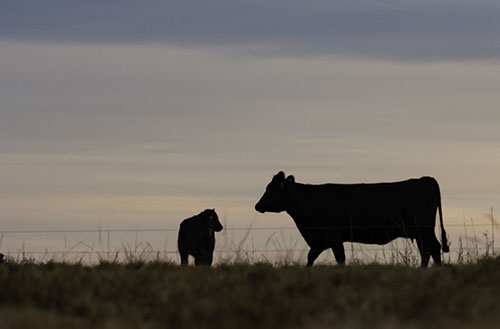Nutrient-dense supplements balance hay, forages
Dec 21, 2020

Think of winter supplementation as a bridge-building project that lasts until spring brings an abundant supply of green grass. As with any project, a well-laid plan is a welcomed tool, if not an absolute necessity. In this bridge, the nutrition required for brood cows to produce at an adequate level represents our destination. The nutritional value of available hay is the starting point. Without an analysis of that hay, our starting point is unknown. It's difficult to get where you want to go if you don't know where you are. Forage-testing is an easy and inexpensive way to characterize the hay or other stored forage that will provide the base of our winter-feeding program.
It's no secret successful cow-calf operations in Tennessee and the Southeast are based on forages. However, these forages must be adequate in quantity and quality to fulfill the nutrient requirements of brood cows at various stages of production. In spring-calving cow herds, the winter supplementation period usually coincides with late gestation and early lactation. Cows in these stages require a significantly higher plane of nutrition than dry cows in early gestation. Regardless of the exact stage of production, beef producers are asking a lot from cows these days. Each cow is expected to give birth to a strong, healthy calf, provide adequate milk to support calf growth, and rebreed within 85 days of calving in order to have a calf every 365 days.
Adequate nutrition is a must because a great deal of fetal growth and development occurs during the 50 days immediately before calving. Insufficient nutrition during this time will influence calf weight, health, vigor, colostrum quality, and calf survivability. Reduced milk production, lower weaning weights, and increased calving intervals are further consequences. The time from calving to rebreeding is considered the most critical period due to protein and energy demands of peak lactation. Nutrition in this period has a major influence on milk production and conception rates, and even under the best conditions, cows often still lose weight.
If your forage test dictates the need for supplementation, several factors must be considered, including stage of production, cow body condition score, and desired frequency of supplementation. Co-op has a product that will fit your needs. These products and their recommended feeding rates are centered around average-quality hay from a “normal” year. Typically, the winter's available forages are often less than average in quality. Thus, there is more distance between the nutrition our cows require and what our forages can provide. We have a longer span to cross. So, we must build a more nutrient-dense supplementation program.
When using forages that are lower in quality than normal, special care must be taken to choose supplements and feeding rates that provide enough protein and energy to meet the needs of our gestating and lactating brood cows. Normally, supplement blocks fed at one to two pounds, cubes fed at two to four pounds, or feeds fed at four to seven pounds per head daily are sufficient to supplement hay of average quality. But, if the base forage is poor quality, producers must either increase feeding rates or choose a supplement that is higher in protein and, equally as important, higher in energy.
Your Co-op feed specialists can assist in evaluating your needs and recommend the proper supplement for your operation.
It's no secret successful cow-calf operations in Tennessee and the Southeast are based on forages. However, these forages must be adequate in quantity and quality to fulfill the nutrient requirements of brood cows at various stages of production. In spring-calving cow herds, the winter supplementation period usually coincides with late gestation and early lactation. Cows in these stages require a significantly higher plane of nutrition than dry cows in early gestation. Regardless of the exact stage of production, beef producers are asking a lot from cows these days. Each cow is expected to give birth to a strong, healthy calf, provide adequate milk to support calf growth, and rebreed within 85 days of calving in order to have a calf every 365 days.
Adequate nutrition is a must because a great deal of fetal growth and development occurs during the 50 days immediately before calving. Insufficient nutrition during this time will influence calf weight, health, vigor, colostrum quality, and calf survivability. Reduced milk production, lower weaning weights, and increased calving intervals are further consequences. The time from calving to rebreeding is considered the most critical period due to protein and energy demands of peak lactation. Nutrition in this period has a major influence on milk production and conception rates, and even under the best conditions, cows often still lose weight.
If your forage test dictates the need for supplementation, several factors must be considered, including stage of production, cow body condition score, and desired frequency of supplementation. Co-op has a product that will fit your needs. These products and their recommended feeding rates are centered around average-quality hay from a “normal” year. Typically, the winter's available forages are often less than average in quality. Thus, there is more distance between the nutrition our cows require and what our forages can provide. We have a longer span to cross. So, we must build a more nutrient-dense supplementation program.
When using forages that are lower in quality than normal, special care must be taken to choose supplements and feeding rates that provide enough protein and energy to meet the needs of our gestating and lactating brood cows. Normally, supplement blocks fed at one to two pounds, cubes fed at two to four pounds, or feeds fed at four to seven pounds per head daily are sufficient to supplement hay of average quality. But, if the base forage is poor quality, producers must either increase feeding rates or choose a supplement that is higher in protein and, equally as important, higher in energy.
Your Co-op feed specialists can assist in evaluating your needs and recommend the proper supplement for your operation.